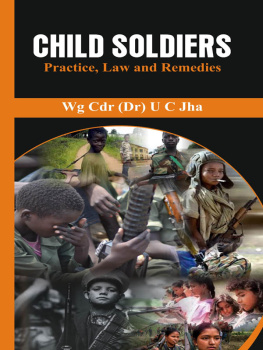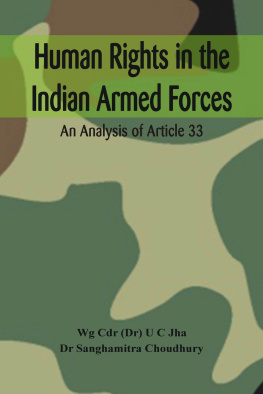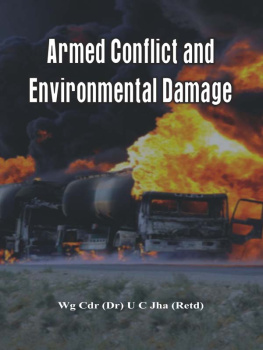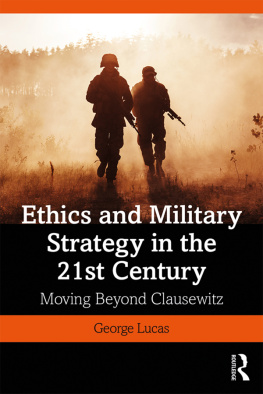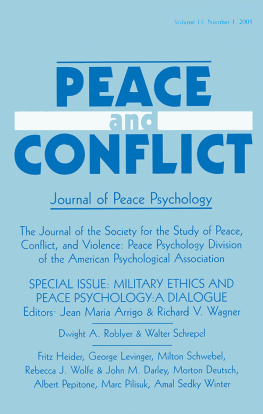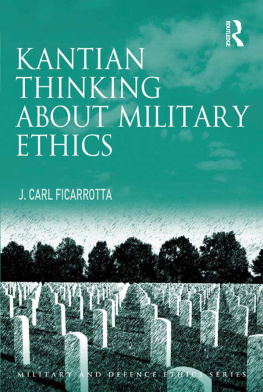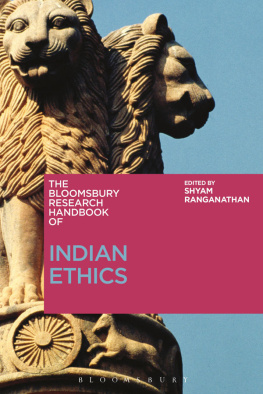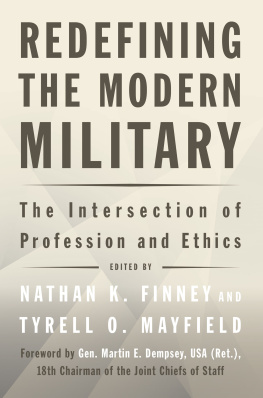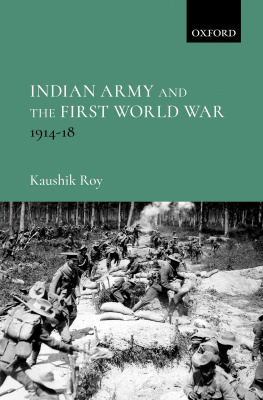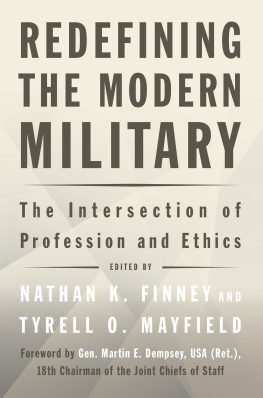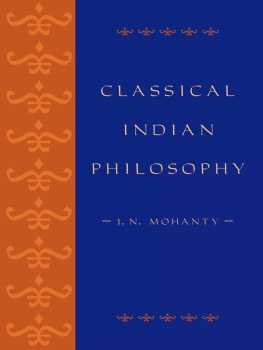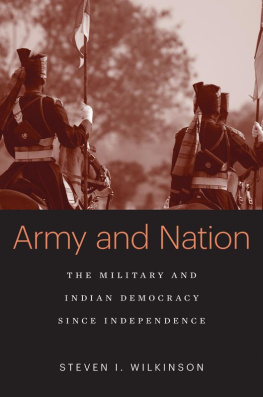Ethics in the Indian Military
Ethics in the Indian Military
by
Wg Cdr (Dr) U C Jha
Vij Books India Pvt Ltd
New Delhi (India)
First Published in India in 2019
Published by
Vij Books India Pvt Ltd
(Publishers, Distributors & Importers)
2/19, Ansari Road
Delhi 110 002
Phones: 91-11-43596460, 91-11-47340674
Fax: 91-11-47340674
e-mail:
web : www.vijbooks.com
Copyright 2019, Wg Cdr UC Jha
ISBN: 978-93-88161- 47-3 (HB)
ISBN: 978-93-88161- 48-0 (ebook)
All rights reserved.
No part of this book may be reproduced, stored in a retrieval system, transmitted or utilized in any form or by any means, electronic, mechanical, photocopying, recording or otherwise, without the prior permission of the copyright owner. Application for such permission should be addressed to the publisher.
This publication is designed to provide accurate and authoritative information to the readers. It is based upon resources which are believed to be reliable and accurate. The authors and publisher are not engaged in rendering any legal service. In case any expert legal assistance is required, the services of a competent legal professional person should be sought.
Military ethics relate to the core values and moral principles that collectively govern the officers and men serving in the armed forces of nations around the world. The ethical foundations, developed over a long period of time, are built on shared values and experiences and serve as the basis for various codes of conduct for warriors and the laws of war or international humanitarian law (IHL). Military ethics incorporate concerns about the conduct of soldiers, how to engage in an armed conflict, and care of those who serve and the retired fraternity.
A few recent publicized events related to ethical issues in the Indian military led to bringing out this publication. In December 2018, the CBI booked two army officers for allegedly taking bribes of over Rs 82 lakh from a civilian supplier for the provision of rations for troops posted in Nagaland. In the same year, an officer posted at the Army Headquarters was arrested for allegedly running a racket of illegal transfers and postings in exchange for money, while two senior officers were subjected to a CBI probe for involvement in corrupt practices and recruitment scams. An army officer appearing in the Defence Services Staff College entrance examination was found using a smart-watch that stored answers to the questions.
The Supreme Court has recently rejected the plea filed by around 700 army personnel protesting the dilution of the protection from prosecution under the AFSPA for alleged fake encounters. During the period 2014 to 2017, the Indian army reported a total of 207 cases of suicide/ fratricide, which included nine officers and 19 junior commissioned officers. There have been a few cases of clashes between officers and the men they command. A number of military personnel took to the social media to air their genuine grievances. Instead of introducing reforms in the grievance redressal system, the military hierarchy threatened them with strict disciplinary action. Finally, an ex-service chief is being investigated for his involvement in corrupt practices in the purchase of helicopters. According to Transparency International, corruption related to defence procurement in India has been high, with a large amount of its procurements shrouded in secrecy with low levels of accountability.
What could be more disheartening than the abhorrent misuse of the legal system by the military and civilian bureaucracy to deny disability-pension to soldiers? In more than 90 percent of such cases, where disability-pension has been awarded by the higher court or tribunal, the government has gone in appeal against own ex-servicemen. While these isolated incidents may seem unrelated on the surface, they reflect deeper institutional shortcomings regarding ethical matters and underlying cultural attitudes related to duties and accountability in the armed forces. These incidents are symptoms of malignancy eating away the integrity, morality and cohesiveness of the military and can have pernicious effects.
These ethical issues may be less alarming or visible than the involvement of senior officers in espionage activities, fake encounters or allegations of enforced disappearances elsewhere, but they are no less serious. They cannot be brushed aside as isolated incidents in a military as large as ours. They need to be addressed by the senior leadership with a high degree of transparency and straightforwardness.
This book has five chapters. The introductory chapter narrates a few serious cases relating to the falling moral values in the armed forces and sets in motion the discussion on the subject matter. The second chapter deals exhaustively with the legal system which governs the armed forces in peace and war. Discipline and obedience are two important virtues essential for the operational effectiveness of the armed forces. Chapter three dwells on various aspects of these twin issues and discusses whether a subordinate would be justified in refusing to execute an illegal order of nuclear strike. Chapter four highlights the value system in the armed forces. It also covers the concept of honest belief in the use of lethal force by military personnel. The fifth and concluding chapter sums up the issues taken up for discussion in the introductory chapter and makes certain recommendations regarding ethical training in the armed forces.
I am grateful to Vij Publishing Group, New Delhi for bringing out this publication.
-U C Jha
Introduction
The armed forces are an essential part of every State. They may have the additional tasks of providing aid to the civil authorities during internal conflicts and taking part in mitigation activities during disasters. They may also be tasked with international activities such being part of the United Nations peacekeeping missions.
In the armed forces command is centralized and a continuous chain of command links the lowest echelon with the supreme commander. The armed forces as an organization expect its members to be disciplined, hard-working and willing to risk their lives. It also requires its members to make collective efforts and place the commands of superiors ahead of their personal needs and judgments. The most unique function of members of the armed forces is to kill people. They have to make split-second, life-or-death judgments with incomplete information. They are commended for killing enemies of the country but can be prosecuted for killing a non-combatant.
The State enrols soldiers and may not allow them to opt out even when the risk to life seems too great. Duty and honour play a greater role in the military than in any other occupation. Self-interest cannot be given the same place in the life of a soldier as in the life of others. Though instantaneous decisions have to be taken during military operations, members of the military are expected to live up to certain standards of ethics even while suffering from fatigue and injury and while fighting under less than ideal environmental conditions. Soldiers are expected to do these things without any advantage to them and to willingly sacrifice their lives.
The Armed Forces in India
The armed forces of India comprise the Army, Navy and Air Force. They serve as the ultimate instrument for maintaining the unity and the integrity of the nation in the face of external threats and internal unrest and disturbances. The major roles of the armed forces are: (a) safeguarding the sovereignty, territorial integrity and unity of India and preserving national interests in conflict areas; (b) assisting civil authorities in coping with internal threats/contingencies and providing aid when requested; (c) participating in peacekeeping operations under the UN charter; and (d) rendering military assistance to friendly foreign countries, when requested. Among all these, aid to the civil authority in the maintenance of law and order is the most sensitive one. The level of violence encountered in such commitments is escalating progressively. The non-State actors are now targeting innocent civilians, media personnel and religious places. In Jammu & Kashmir (J&K), schools have been systematically destroyed by them to deny education to children. Under such conditions, the deployment of the armed forces has to be planned meticulously, bearing in mind the prevailing sensitivities.



